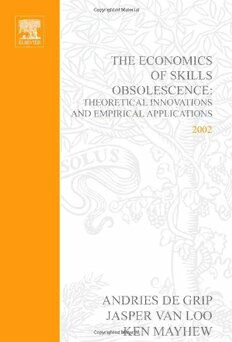
The Economics of Skills Obsolescence, Volume 21: Theoretical Innovations and Empirical Applications (Research in Labor Economics) PDF
290 Pages·2002·2.176 MB·English
Most books are stored in the elastic cloud where traffic is expensive. For this reason, we have a limit on daily download.
Preview The Economics of Skills Obsolescence, Volume 21: Theoretical Innovations and Empirical Applications (Research in Labor Economics)
Description:
Increasingly policy makers are focusing on the importance of skills and lifelong learning. The reason for this is that workers with sufficient and up-to-date skills are more productive and have more potential to remain employed. However, the processes that influence skill obsolescence, have largely been neglected in labor economics. It was in the 1990s that skill issues came to the top of the agenda, because of the general awareness of the rapid technological developments that affect the demand for human capital. Although the analysis of skill-biased technological change is at the heart of this debate, in recent years, the literature has become wider than simple consideration of this aspect and has started to embrace other causes of obsolescence. The papers in this volume are selected from the papers presented at a conference on Understanding Skills Obsolescence. They advance both the theoretical and empirical understanding of the causes and the effects of skills obsolescence.
See more
The list of books you might like
Most books are stored in the elastic cloud where traffic is expensive. For this reason, we have a limit on daily download.
